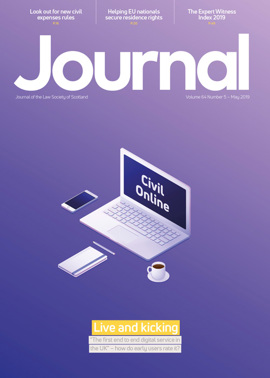Taxing times for litigators

Two Acts of Sederunt that came into force on 29 April 2019 make significant changes to the law and practice governing the taxation of expenses awarded in civil proceedings. Solicitors practising in this field would be well advised to familiarise themselves with their terms. This article aims to highlight some of the key features.
Act of Sederunt (Taxation of Judicial Expenses Rules) 2019 (“the Taxation Rules”) governs the taxation of accounts of expenses remitted to the auditor in most proceedings commenced on or after 29 April. Appellate proceedings in the Sheriff Appeal Court (SAC) and in the Inner House of the Court of Session are treated as distinct from first instance proceedings for this purpose, and will therefore be subject to the new rules where the appeal is commenced on or after 29 April. However, summary cause proceedings are completely excluded from the rules, even when commenced after that date. For the limited remaining life of the summary cause procedure the taxation of expenses awarded in such cases will continue to be governed by the existing rules.
“Charges” by the unit
The substantive changes brought about by the Taxation Rules are relatively limited. In many respects the function the new rules serve is to restate the pre-existing law in this field, with modifications to make it more accessible, more coherent and more consistent.
In place of the disparate sources of law and practice to which practitioners have previously had to refer, the Taxation Rules have therefore been designed to operate as a comprehensive source of the rules regulating the taxation of accounts for all courts and all forms of procedure.
The language of the existing rules owes much to the outdated theory that what is being taxed is the account that the successful party has incurred to their solicitor, comprising the solicitor’s fees and the solicitor’s outlays. The language adopted in the Taxation Rules seeks to reflect the reality that the agent and client feeing arrangements normally have no bearing on what a party is entitled to recover by way of judicial expenses. References to fees have therefore been replaced with references to the “charges” that the successful party is allowed to recover from the paying party in respect of the work carried out by their solicitor.
In place of the existing tables of fees, in which each fee is individually ascribed a monetary value (there are about 770 of them), the Taxation Rules adopt the approach of expressing each charge as a multiple of a unit, and only ascribing a monetary value to that unit. This means that subsequent general upratings of charges can be achieved simply by amending the value of the unit.
The unit selected corresponds to six minutes of chargeable time. In order to reflect this, charges for time engaged have been based on six-minute blocks of time in the new tables in place of the conventional 15-minute blocks. The hourly rate of £164 that has underpinned the existing tables of fees since the last uprating in September 2018 has been adopted, so the initial value of the unit is £16.40.
As at present, the successful party can generally choose whether to prepare an account on the basis of detailed “time and line” charges, or on the basis of inclusive charges for chapters of work. Rule 3.3 sets out which of the tables of charges in the schedules to the rules can or should be used. The new tables have been designed to be broadly cost-neutral compared with the existing tables of fees. By way of example, the abolition of the 10% process fee previously allowed in sheriff court ordinary cause accounts has been matched by increases in a number of other charges.
In the existing tables, fees for simple procedure cases are based on a lower hourly rate. In order to replicate the effect of this without having two separate units, or without adopting awkward multiples of units, the Taxation Rules adopt the approach of using the same unit, but requiring the total charges in simple procedure accounts to be discounted by 10% (rule 3.7). As at present, a further discount will apply where the value of the claim is £2,500 or less.
Counsel and experts: ask in advance
Some of the more substantive changes affecting practitioners are to be found in the provisions regulating the recovery of counsel’s fees and of payments to experts, all as set out in rules 4.3, 4.5, 5.3 and 5.4. These give effect to a number of the recommendations made in Sheriff Principal Taylor’s Review of Expenses and Funding of Civil Litigation.
It remains the position that the successful party will not be allowed to recover fees incurred to an expert unless the expert has been certified by the court, or to recover fees incurred to counsel (including a solicitor advocate) in sheriff court or SAC proceedings unless the proceedings, or particular work involved in the proceedings, have been sanctioned as suitable for the employment of counsel. The test applied when considering an application to certify an expert has been modified in that the court now requires to be satisfied that it was both reasonable and proportionate to employ the expert. The test applied when considering an application to sanction proceedings for the employment of counsel remains that set out in s 108 of the Courts Reform (Scotland) Act 2014.
Where sanction has been granted and fees have been incurred to senior counsel, the auditor has to disregard counsel’s seniority when determining the level of recoverable fees unless the court has specifically sanctioned the proceedings as suitable for the employment of senior counsel. It is therefore important that this should be specified in the application for sanction.
In simple procedure cases, proceedings in the SAC, and personal injury cases under the “case flow management” chapters it is still possible, although not necessary, to delay applying for sanction or certification until the conclusion of the proceedings. In all other cases the general rule is now that sanction or certification only operates prospectively, i.e. in relation to work carried out after the date of sanction or certification. The court has a discretion to backdate sanction or certification where the applicant shows cause for not having applied previously, e.g. where it was necessary to instruct an expert prior to the commencement of proceedings. However, when backdating sanction for the employment of counsel the court must specify what work is covered and the auditor may only allow the fees incurred for that work.
More points to note
Other changes brought about by the Taxation Rules include:
Additional charges: The additional fee rules have been largely reproduced, but applications have been made subject to an overriding test, which is whether an additional charge is justified to reflect the responsibility undertaken by the solicitor in the conduct of the proceedings.
Payments to witnesses: The provisions about what a witness is entitled to be paid have been separated from the provisions about the recovery of payments to witnesses, and are set out in rule 7.1 and sched 6. Attention is drawn to the introduction of a mechanism under which a dispute about a witness’s entitlement to payment can be remitted to the auditor.
Shorthand writers: The provisions regarding the fees of shorthand writers, as set out in rule 7.2 and sched 7, have been modified to introduce provision for travelling time and reimbursement of expenses.
Copying and scanning: A simplified basis for charging for copying and scanning documents, applying across all forms of procedure, is set out in rule 3.4.
Standard time limit
While the substantive body of rules governing the taxation of accounts is set out in the Taxation Rules, taxation procedure continues to be regulated by the court rules to which the particular case is subject. These procedural rules are amended by Act of Sederunt (Rules of the Court of Session, Sheriff Appeal Court Rules and Ordinary Cause Rules Amendment) (Taxation of Judicial Expenses) 2019. In large part the effect of the amendments is to promote standardisation by bringing aspects of ordinary cause and SAC taxation procedure into line with that already adopted in the Court of Session.
In particular the requirement to lodge accounts for taxation no later than four months after the date of the final judgment has been extended to ordinary causes and SAC appeals, in line with the recommendations of Sheriff Principal Taylor’s review. An account can only be lodged after the expiry of the four-month limit with permission of the court, which can be sought in advance. The time limit applies in any proceedings in which the date of the final judgment is on or after 29 April. Most of the other procedural changes apply where the account is lodged for taxation on or after the same date. These include new
rules governing:
- the information and materials that require to be provided to the auditor before a diet of taxation is fixed;
- how diets of taxation are fixed and intimated;
- the giving of advance notice of points of objection; and
- the procedure for challenging a taxed account.
Practitioners will wish to note that longstanding references to the auditor’s report have been dispensed with. Auditors are instead simply required to produce a “statement of the amount of expenses as taxed”. This recognises that such a statement is what is produced in practice, and that the auditor’s report had become a potentially confusing misnomer.
Finally, the amendments also give effect to one of Sheriff Principal Taylor’s recommendations relating to interest on expenses. In both Court of Session proceedings and sheriff court ordinary causes the court will now have a discretion to award interest on taxed expenses from a date prior to the date of the auditor’s statement, but no earlier than 28 days after the account was lodged for taxation.
In this issue
- Claiming under the advance payment scheme
- Time for a written constitution
- New form F9: worth the wait?
- Wedded to a matrimonial property regime
- Brexit divorce set to increase UK's “skype families”
- Corporate personality: Justice v Doctrine
- Reading for pleasure
- The Law Society of Scotland Expert Witness Index 2019
- Opinion: Judith Robertson
- Book reviews
- Profile: Michael Clancy
- President's column
- Is your legal data being held to ransom?
- People on the move
- Sign up – log in – action!
- Frozen out?
- Taxing times for litigators
- DNA analysis: when research just isn’t enough
- Brexit focus: EU citizen settlement remedies
- Why employers should report on wellbeing
- 3% – and then what?
- 1,000 days of mediation
- Barred from acting
- To name or not to name?
- Enter the “What I Think”
- Fixed penalties and fair trials
- Auto-enrolment: keeping employers on their toes
- Scottish Solicitors' Discipline Tribunal
- Vulnerable accused: a need for knowledge
- Burdens and who can enforce them
- Convener’s final bow
- Public policy highlights
- TCSP review update
- Westminster: answering the call
- Accredited paralegal practice area highlight: family law
- Accredited Paralegal Committee profile
- Nyona named star paralegal
- Ask Ash
- Moving nightmares part 2
- Complaints: seeking consistent practice
- Morally bankrupt?
- For the elderly: how SFE works
- Standing up to challenge






